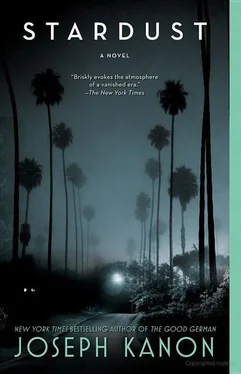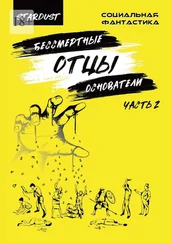Joseph Kanon - Stardust
Здесь есть возможность читать онлайн «Joseph Kanon - Stardust» весь текст электронной книги совершенно бесплатно (целиком полную версию без сокращений). В некоторых случаях можно слушать аудио, скачать через торрент в формате fb2 и присутствует краткое содержание. Жанр: Триллер, на английском языке. Описание произведения, (предисловие) а так же отзывы посетителей доступны на портале библиотеки ЛибКат.
- Название:Stardust
- Автор:
- Жанр:
- Год:неизвестен
- ISBN:нет данных
- Рейтинг книги:4 / 5. Голосов: 1
-
Избранное:Добавить в избранное
- Отзывы:
-
Ваша оценка:
- 80
- 1
- 2
- 3
- 4
- 5
Stardust: краткое содержание, описание и аннотация
Предлагаем к чтению аннотацию, описание, краткое содержание или предисловие (зависит от того, что написал сам автор книги «Stardust»). Если вы не нашли необходимую информацию о книге — напишите в комментариях, мы постараемся отыскать её.
Stardust — читать онлайн бесплатно полную книгу (весь текст) целиком
Ниже представлен текст книги, разбитый по страницам. Система сохранения места последней прочитанной страницы, позволяет с удобством читать онлайн бесплатно книгу «Stardust», без необходимости каждый раз заново искать на чём Вы остановились. Поставьте закладку, и сможете в любой момент перейти на страницу, на которой закончили чтение.
Интервал:
Закладка:
Her arrival seemed to give permission to start: a man went to the wall and turned to face them, opening his hands. Ben had been told there would be a rabbi, but his dark suit was like all the others and the service was so secular, no religion specified, that Ben wondered if the cemetery had rules about who could be buried there. Judenrein. He looked at the flowers, bouquets, and wreaths with long name ribbons in the German style, then at the open square where they would put the box. After which everyone could move on. He felt Liesl next to him, holding herself erect, getting through it. What would Kelly find, a tabloid love triangle, with pictures of the Cherokee nest? Bury him. Why not a tipsy fall? What difference did it make?
“Heinrich Kaltenbach will say a few words.”
The little man who’d come with Alma opened a piece of paper, then closed it, visibly upset, his round face drawn.
“Only a few, not a speech,” he said, his accent thick, uncomfortable. “I speak also for Alma and Franz, for many of us here. There is for us a great debt. We owe this man our lives. He came with us. On foot. Only a little farther, he would say. To the border. You remember, Alma?” he said, looking at her, waiting for her nod, a little drama. “And you know what she’s carrying, in the suitcase? The manuscript. Bruckner’s Fourth. So not just lives, culture, he’s saving culture. For this everybody owes him. Please, if you don’t mind,” he said, then switched into German, his speech picking up pace, fluent now.
The Americans stood respectfully, trying not to look blank, but for the Germans it was a release, something real after the generic service, with the heft of language. Ben looked at them. Just the sound could take them back-the lucky ones, the ones who’d left. But what choice had there been? If they had stayed, they’d be dead. Like Otto. Ashes, too.
His mind wandered, the sound of German fading into the background, overheard but not distinct, as if it were coming up the stairs from one of his father’s parties. Danny would be down in the kitchen, sneaking drinks from the indulgent staff.
He froze. He looked at the marble wall, seeing Danny as a teenager, his head over a toilet bowl, retching, swearing he’d never touch brandy again. And never did. An almost allergic reaction, not his drink at all. But there was the bottle sitting on the counter at the Cherokee, suggestive. A prop. Which meant someone had put it there.
Ben felt a prickling on his neck. Someone else in the room. The door had been locked-the police had needed a passkey. But there could have been another, a duplicate to lock the door behind you. Without thinking, he turned, looking back at the crowd for the man in the gray suit. Near the edge, still watching, like someone on duty. But why come to the funeral if you’d already filed it as an accident? Case closed. Unless it wasn’t. His mind darted to the stairs, the alley, trying to work out the logistics, as if somehow that would make it all plausible. But how could it be? Could someone really have killed him? Why? Why were people murdered? Jealousy. Revenge. Because they were in the way. In stories, not in real life. Then he thought of the film clips waiting to be assembled at Continental. Why. Millions and millions for no reason at all.
Kaltenbach finished, the sudden quiet like a touch to Ben’s shoulder. His eyes went to the rabbi, placing the box in the square, then handing Liesl a flower to put with it. She stood still for a second, then took Ben’s hand, drawing him with her to the wall. He was given another flower and then, as if it had been rehearsed, they put them in together, one on each side of the box. When she finished she gave Ben a weak smile, her eyes confused, still not sure how to feel. He looked at the box, suddenly overwhelmed, feeling a loneliness he’d resisted before. Danny was gone, for good. Not just gone, taken away. By what right? And it wasn’t just Danny. A death spread out in shock waves, touching other people, changing them, taking pieces of them, too. Demanding some kind of justice. You owed the dead that much. How could he want it for millions and not this one?
Only a few Americans came back to the house afterward, so the lunch turned into a German gathering, the language floating warm and familiar around the buffet table like the wisps of steam from the chafing dishes. The caterer had come through with the salmon and what looked like a dozen other dishes, but people had brought things, too, brisket and cakes, an unexpected homey touch. All of it was being eaten, heaping plates and seconds. Liesl, who might have sat in a corner, receiving, instead was everywhere, seeing to people, playing hostess. Ben watched her, waiting for signs of strain, but he saw that the nervous activity, with its chin-high assurance, was also a kind of protective screen, like sunglasses. There were no whispered concerns, no side glances to see how she was holding up. She was right in front of them, busy, in control.
Instead, to his surprise, he found that he had become the center of attention, new ears for old complaints. The curfew during the war. The five-mile restriction for aliens. Gas coupons. All that over, thank god. And then, in lower tones, what was it really like now in Germany? You hear such stories. And the newsreels. You can’t recognize things anymore. That madman. Ben heard half of it, distracted, back at the Cherokee, his head noisy with questions. A bottle that shouldn’t be there. Someone else. An idea, once there, you couldn’t leave behind, not for polite conversation. So he nodded, answering with only part of his mind, and they backed away, respecting what they took for grief, not wanting to trouble him further. But keeping an eye on him, intrigued.
“It’s like any colony,” Liesl said when they got a moment. “They like to be with each other, not the natives, but they get a little bored, too. So you’re something to talk about. Here comes Heinrich. Be nice. I don’t know how he lives.” She leaned forward to kiss Kaltenbach’s cheek. “Heinrich, thank you. It was lovely.”
“From here,” he said in German, tapping his chest, then turned to Ben, the rituals of introduction.
“I didn’t know,” Ben said, “about his time in France. Getting people out.”
“Yes, many,” Kaltenbach said, still in German. “Some by boat, but that was difficult. So, Spain.”
“Over the Pyrenees?”
“Yes. The mountain crossings were easier than the trains. Not so strict. One guard, maybe two. Sometimes you could walk in. If you got up there. Imagine, Franz and Alma, at their age. Not hikers, you know, not young men like your brother. It’s a very dramatic story.”
“Excuse me,” Liesl said. “There’s Salka.”
“Very dramatic. A film,” Kaltenbach said. “I think so. Think of it, everybody waiting to get out. The noose tightening. You know what we called the house? Villa Espere Visa. But your brother acted. It would be a tribute to him. His story. I have a treatment of this, I’ll show it to you. Exit Visa. See what you think. They could do it at Continental. That’s where you are, yes? Your brother’s story. It would be a gift to his memory.”
Ben looked at him, feeling ambushed.
“I’m not really at Continental. Just putting something together there for the Army.”
And how had he heard about Continental anyway? Ben marveled again at the speed of news here, Lasner in touch even on a train.
“But you’ll read it. You’ll see,” Kaltenbach said. “An exciting film. And you know I can work with another writer. For the English. But who knows the story better? Who lived it?”
“Ben,” Liesl said, coming up to them, a short, plump woman in tow, “you have to meet Salka. She’s everyone’s mother.”
“Everyone’s cook,” the woman said, taking Ben’s hand. “They come for the chocolate cake, not for me.”
Читать дальшеИнтервал:
Закладка:
Похожие книги на «Stardust»
Представляем Вашему вниманию похожие книги на «Stardust» списком для выбора. Мы отобрали схожую по названию и смыслу литературу в надежде предоставить читателям больше вариантов отыскать новые, интересные, ещё непрочитанные произведения.
Обсуждение, отзывы о книге «Stardust» и просто собственные мнения читателей. Оставьте ваши комментарии, напишите, что Вы думаете о произведении, его смысле или главных героях. Укажите что конкретно понравилось, а что нет, и почему Вы так считаете.












